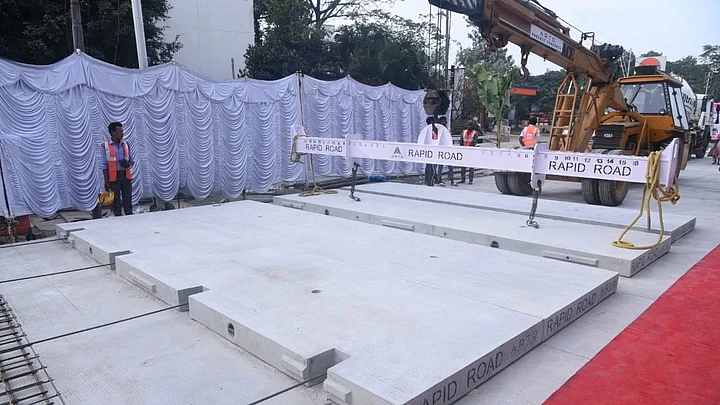Karnataka Chief Minister Basavaraj Bommai inaugurated a 375-metre-long, newly constructed road in Bengaluru's Indira Nagar on 8 December. This road employed a new technology, implemented by the Karnataka government along with the Bruhat Bengaluru Mahanagara Palike (BBMP), called 'rapid road.'
If all goes well, the BBMP could decide to rollout the technology across the city. But is rapid road tech useful?
What is rapid road technology?
Building roads using large cement blocks which are 5-feet-long and 20-feet-wide.
Cement blocks are precast in workshops and later brought to the site and placed together.
Cement blocks placed next to one another are fastened using steel cables.
Why opt for rapid roads? The BBMP thinks these roads will not last long but will take less time to build.
A BBMP source told The Quint:
It takes only 24 hours to lay a one-kilometre-stretch of rapid road.
Vehicles can ply over the road almost immediately after it's laid.
Is it cost effective? According to Basavaraj Bommai asphalt road would cost Rs 75 lakh per kilometre where as a white-top road would cost between Rs 9 and 10 crore per kilometre.
Rapid road is the middle ground. It costs less than asphalt road but more than white-top road.
Here's the math:
Precast cement blocks used to build rapid roads will cost Rs 12.5 crore per kilometre.
Additional logistics and labour costs will be around Rs 2 crore.
In total, cost of one kilometre of rapid road will be approximately Rs 15 crore.
This means that the rapid roads would cost approximately 50 percent more than white-top road and 50 percent less than asphalt road.
Why was rapid road considered? Since January 2022, Bengaluru has witnessed over 13 deaths due to potholes, and the BBMP has been criticised for building low quality roads and pavements across the city.
To solve Bengaluru's pothole problem, the Karnataka government thinks rapid road is the solution.
The catch: While rapid roads could be a cost-effective, though short-lived solution, there are environmental costs involved. If rapid roads are laid above poorly managed asphalt roads to cover potholes, there could be more trouble.
"If rapid roads are laid above the existing asphalt roads, the buildings adjacent to these will get flooded due to the road's elevation. This would certainly affect the water table of the entire region."S Vishwanath, Water Expert and Architect
(At The Quint, we question everything. Play an active role in shaping our journalism by becoming a member today.)
